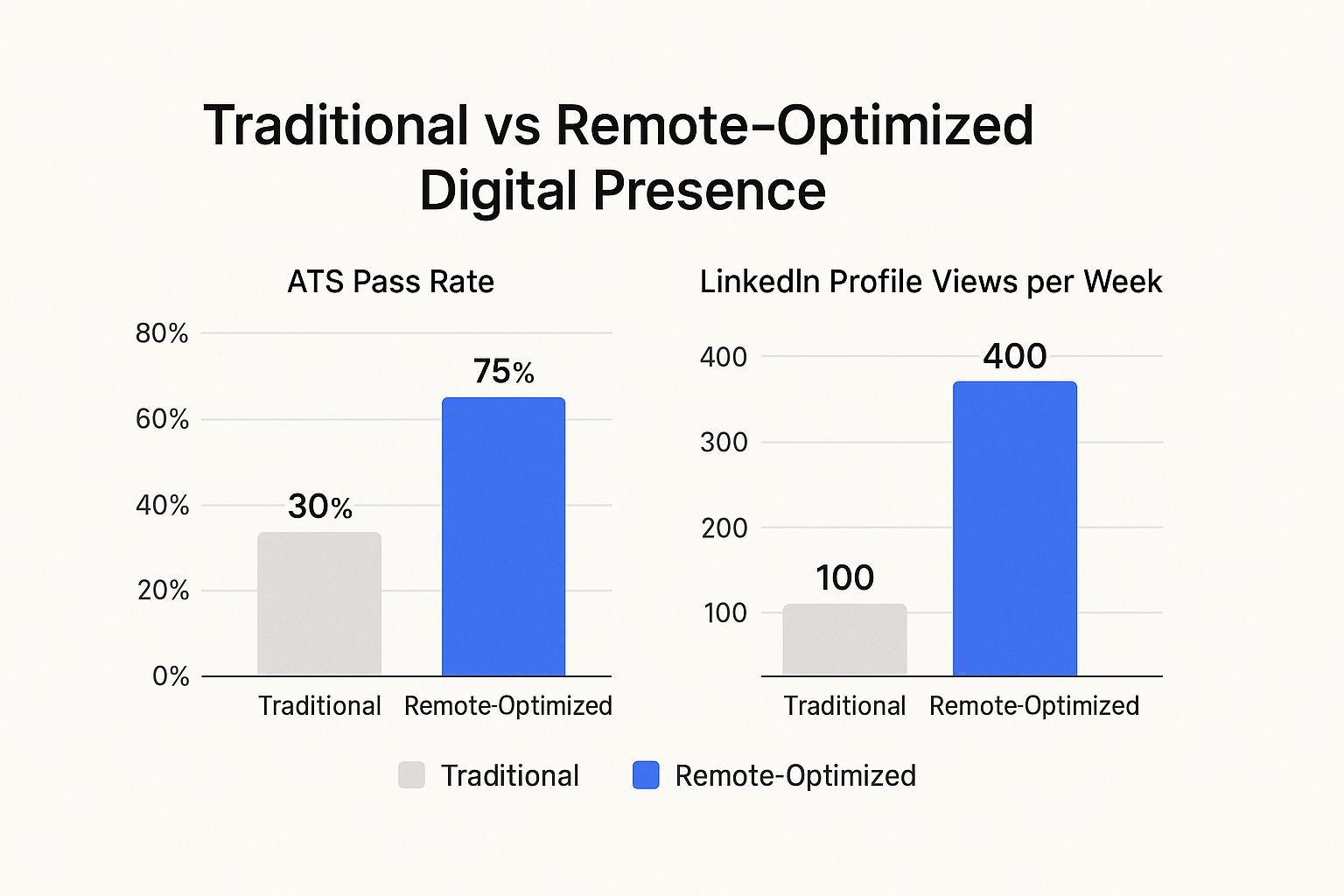How to Get a Remote Job You Actually Love

Landing a remote job isn't just about wanting to work from home; it's about proving you can excel without someone looking over your shoulder. The whole process starts with some crucial groundwork: figuring out which of your skills are genuinely remote-friendly, defining what your ideal role actually looks like, and maybe even beefing up your qualifications to get noticed.
Nailing this prep work makes your entire search more focused and a whole lot more effective.
Building Your Foundation for a Remote Career

Before you even think about scrolling through job boards, you need a solid plan. A successful remote job hunt is built on honest self-reflection and a clear-eyed view of what companies actually need from their remote employees. It's less about your technical chops and more about the soft skills that scream "I'm a reliable self-starter."
Assess Your Remote Readiness
First things first, take a hard look in the mirror. Are you disciplined enough to stay on task when your couch, TV, and fridge are calling your name? Remote work is a masterclass in self-motivation and time management. Proving you can stay focused and deliver quality work without direct supervision is your first and most important challenge.
Then, think about how you communicate. Remote teams live and die by their ability to communicate clearly in writing through tools like Slack or Notion. You have to be able to get your point across without the benefit of body language or immediate back-and-forth. This isn't just a nice-to-have; it's a core skill that hiring managers are actively looking for.
Identify Your In-Demand Skills
Next, it's time to take inventory of the skills that make you a great remote candidate. Don't just list your job duties; think about the abilities that show you're autonomous and dependable.
- Project Management: Can you point to a time you took a project from concept to completion with little hand-holding? That’s gold.
- Problem-Solving: Do you have examples of when you spotted a problem and fixed it on your own initiative?
- Digital Proficiency: How quickly can you get up to speed with new software? Remote companies love people who are tech-savvy and quick learners.
The trick is to frame your past experience for a remote audience. Don't just say you "worked on a team." Instead, try "collaborated with a distributed team across multiple time zones using asynchronous tools to deliver the project ahead of schedule." See the difference?
Invest in Your Qualifications
In a sea of applicants, continuous learning is what will make you float to the top. Certifications in your industry or even an advanced degree can give your profile a serious boost.
The numbers don't lie. According to U.S. Bureau of Labor Statistics data from March 2025, a whopping 42.8% of employees with an advanced degree worked remotely at least some of the time. Compare that to just 9.1% of workers with only a high school diploma.
Investing in your education sends a powerful signal to employers: you've got the drive and the expertise to succeed on your own. If you're weighing your options, our guide on transitioning to remote work has some great advice to get you started.
Crafting Your Remote-Ready Digital Presence
When you're chasing a remote job, your resume and LinkedIn profile are doing all the talking for you. They're your digital handshake, and they have to instantly convince recruiters and hiring bots that you've got what it takes to thrive without someone looking over your shoulder. A generic resume just gets lost in the noise of a global talent pool.
You have to get inside the head of a remote hiring manager. They’re hunting for specific clues—keywords and phrases—that show you’re not just capable, but you actually get what it means to work on a distributed team.
Optimizing Your Resume for Remote Roles
First things first: your resume has to beat the bots. Before a human ever lays eyes on it, it’s likely going through an Applicant Tracking System (ATS). These systems are programmed to flag candidates who seem like a good fit for remote work.
This means you need to go beyond just listing your old job duties. It's about strategically weaving in language that screams autonomy and remote-readiness.
- Asynchronous Communication: Talk about your experience with tools like Slack, Notion, or Asana. Show you know how to keep projects moving forward, even when your team is scattered across different time zones.
- Distributed Teams: Did you work with colleagues in another office? Or another country? Don't just gloss over that. Explicitly mention that you collaborated with a "distributed team." That's a huge green flag.
- Self-Management: Your word choice matters. Use powerful action verbs that prove you're a self-starter. Think "spearheaded," "independently managed," or "drove projects from conception to completion."
Let’s make this real. Instead of a bland "Responsible for team projects," try this: "Independently managed a project pipeline for a distributed marketing team, coordinating deliverables asynchronously to ensure on-time completion." See the difference? One is passive, the other shows you take ownership.
Building a LinkedIn Profile That Attracts Recruiters
Think of your LinkedIn profile as your professional highlight reel. It needs to be a magnet for recruiters who are specifically sourcing remote talent. This is about more than just filling out every section.
The easiest win? Flip on the "Open to Work" feature and make sure you specify that you are only interested in remote positions. This puts you directly in the path of recruiters using those filters on LinkedIn.
Next, sprinkle some remote-friendly keywords into your headline and "About" section. Your headline isn't just your job title. It could be something like, "Senior Software Engineer | Building Scalable Solutions for Distributed Teams." Your summary should tell a story of how you get things done from a home office, not just what you do.
The impact of these changes isn't trivial. Just look at the difference a remote-optimized presence can make.

When you tailor your materials, you more than double your chances of passing that initial ATS screening and can quadruple your weekly profile views. It's a game-changer.
If you want to dig deeper, you can find a ton of helpful guides and tools in these excellent remote work resources. Putting in the effort to build a strong digital presence is one of the most important investments you'll make in your remote job search.
Finding and Vetting Genuine Remote Opportunities

Alright, your resume and online profiles are looking sharp. Now comes the exciting part: diving into the job market to find that perfect remote role. The remote work world is bigger than ever, which is fantastic, but it also means there's a lot of noise to cut through.
The great news is that companies are all-in on remote work. In 2023, about 28% of employees worldwide were already working remotely at least part-time. On top of that, nearly 60% of employers now consider themselves ‘Team Remote’. This isn't just a trend; it's a fundamental shift, creating a huge pool of legitimate opportunities. You can get a deeper look at these numbers by exploring the full research on remote work statistics.
The downside? This boom has also attracted its fair share of scammers. Your main task now is to efficiently filter through the listings to find the real gems that match your career goals.
Focus on Niche Remote Job Boards
Think of it this way: you wouldn't go to a general department store to buy specialized hiking gear. The same logic applies to your job search. Instead of getting lost on massive, all-purpose job sites, focus your energy on platforms built specifically for remote work.
These niche boards are curated, meaning someone else has already done a lot of the initial filtering for you. You’ll spend far less time sifting through "remote-optional" roles that still want you in the office three days a week.
Here are a few places to start:
- RemoteWeek: Our platform is dedicated to connecting you with fully remote roles from vetted companies across the globe.
- We Work Remotely: As one of the largest remote work communities out there, it’s a great place to find jobs in everything from customer service to programming.
- FlexJobs: This is a subscription-based service, but for good reason. They hand-screen every single listing to make sure it's a legitimate, flexible, and scam-free opportunity.
To get the full picture and diversify your search, take a look at our complete guide to the best remote job boards.
Your goal isn't to apply everywhere; it's to apply to the right places. Focusing on a handful of high-quality, remote-first job boards will yield better results than a scattergun approach on massive, generalized sites.
Top Platforms for Finding Remote Jobs
Navigating the different job boards can feel overwhelming. This table breaks down some of the most popular platforms to help you target your search where it will count the most.
| Platform | Best For | Key Feature | Subscription Required? |
|---|---|---|---|
| FlexJobs | Professionals seeking vetted, flexible, and scam-free listings across all industries. | Every job is hand-screened for legitimacy. | Yes |
| We Work Remotely | Tech professionals, but with a growing number of roles in design, marketing, and support. | Huge volume and a well-established community. | No |
| Remote.co | A broad range of remote jobs, including non-tech roles like virtual assistants and writers. | Curated list from companies that are genuinely remote-first. | No |
| Remote OK | Tech-focused roles, especially for developers and digital nomads. | Aggregates listings from multiple sources and offers salary data. | No |
Choosing the right platform is about aligning its strengths with your career goals. Spend your time on the one or two that best fit your industry and skill set for a more focused and effective search.
Spotting Red Flags and Scams
As you browse listings, it’s crucial to have your scam-detector on. Legitimate companies have professional, structured hiring processes. Scammers, on the other hand, often leave behind clues that something isn't right.
Be on the lookout for these common red flags:
- Vague Job Descriptions: If you can't figure out what the job actually is, it's probably a front for something you don't want, like a multi-level marketing scheme.
- Requests for Personal Info Early On: A real employer won't ask for your social security number or bank details before you've signed a formal offer. This is a classic identity theft tactic.
- Unprofessional Communication: Watch out for emails riddled with typos, poor grammar, or sent from a generic address like a Gmail or Yahoo account.
- "Too Good to Be True" Offers: An offer of sky-high pay for little experience or a job offer without a real interview is almost always a scam.
Always trust your gut. If something feels off, it probably is. And remember, a legitimate company will never ask you to pay for your own training or equipment before you start.
Researching a Company’s Remote Culture
Finding a real job is step one. Step two is finding a company that actually gets remote work. Many companies claim to be "remote-friendly" but still operate with an office-centric mindset, which can be incredibly frustrating for remote employees.
Before you even think about applying, do a little detective work.
Check out their website, social media profiles, and what current or former employees are saying on sites like Glassdoor. Do they talk about asynchronous work? Do they offer a home office stipend or other remote-specific perks? Do they proudly highlight their distributed team members? These are the signs of a company that is truly invested in making remote work a success for everyone.
Mastering the Virtual Interview

This is it—the final performance before the offer. When you're going for a remote role, the virtual interview is where you prove you have the polish and professionalism to be a great colleague, even from a distance. The hiring manager isn't just listening to your answers; they're observing how you communicate and present yourself in a digital setting.
Your environment and tech setup are just as crucial as what you say. Think of your video call space as an extension of your professional brand. You need to show you can handle the tech side of remote work without a hitch. A flawless setup sends a clear signal: you’re serious, prepared, and ready to contribute from day one.
Setting the Stage for Success
Before you even worry about answering questions, get your environment under control. A spotty internet connection or a messy background can instantly make you seem unprofessional, no matter how qualified you are. The goal is to make the technology disappear so the focus is entirely on you.
I always tell people to think of it this way: you wouldn't show up to an in-person interview with a wrinkled shirt. A chaotic background or garbled audio is the virtual version of that same mistake.
Here’s a quick checklist to run through:
- Do a Tech Rehearsal: At least 30 minutes before the interview, test everything. Check your internet speed, your camera, and your microphone. Make sure the platform—whether it's Zoom, Google Meet, or something else—is updated and works on your machine.
- Find Your Light: Natural light is your best friend. Try to sit facing a window. If that isn't an option, put a lamp in front of you. Never have your primary light source behind you, or you’ll turn into a silhouette.
- Curate Your Background: Keep it clean and simple. A tidy bookshelf, a neutral-colored wall, or a single piece of art is perfect. Steer clear of cluttered spaces or personal photos that could sidetrack the conversation.
Answering Remote-Specific Questions
When you're interviewing for a remote position, expect questions designed to test your self-discipline and ability to work independently. The hiring manager needs to trust that you can perform without someone looking over your shoulder. You'll need to have specific examples ready to go.
A common question is, "How do you stay motivated and manage your time without direct supervision?" The worst thing you can do is give a generic answer like, "I'm a self-starter."
A much stronger approach is to give a real-world example: "In my previous role, I relied on Asana for tracking my project milestones and used the Pomodoro Technique to keep myself focused throughout the day. This system helped me consistently deliver projects 15% ahead of schedule and allowed my team to see my progress without needing constant check-in meetings."
See the difference? That kind of answer provides tangible proof. You're showing them you already have a working system for productivity and that you understand how to collaborate asynchronously.
Prepare a few stories that highlight your proactive communication, independent problem-solving, and time management skills. This is how you build confidence and prove you're the low-risk, high-reward candidate they're looking for.
Negotiating Your Offer and Setting Up for Success
Getting that job offer is a fantastic feeling, but don't pop the champagne just yet. This is where you have a real chance to shape the role into something that truly works for you long-term.
While salary is always front and center, a great remote offer is about so much more. It needs to account for the unique realities—and costs—of working from home.
Looking Beyond the Salary
When you're looking at the offer, try to see the whole picture. A slightly lower base salary might actually be the better deal if it's bundled with benefits that save you significant money elsewhere.
It’s smart to open up a conversation about these perks. It shows the company you're thinking strategically and are serious about setting yourself up for success with them.
Here are a few common remote-specific benefits that are definitely worth asking about:
- Home Office Stipend: This could be a one-time payment or an annual allowance to buy essentials like a proper ergonomic chair, a good desk, or a second monitor.
- Internet and Phone Reimbursement: A monthly stipend to help cover your high-speed internet is a common and reasonable request. It's a critical utility for your job, after all.
- Coworking Space Membership: Don't love working from home 100% of the time? Some companies will cover a membership at a local coworking spot.
- Professional Development Budget: This can cover online courses, certifications, or virtual conference tickets to help you stay at the top of your game.
The goal isn't just to land a remote job; it's to land one that empowers you to do your best work. Asking for a home office stipend isn't greedy—it's about making sure you have the professional-grade setup you need to excel.
Navigating Location-Based Pay
Here’s where things can get a bit tricky: location-based pay. Many companies adjust salary offers based on the cost of living where you are. It’s absolutely essential to find out the company’s policy on this early on.
If you’re thinking about moving, you need to be upfront about it.
The freedom to relocate is one of the biggest draws of remote work. In fact, data for 2025 showed that 20% of remote workers planned on moving, often for a better lifestyle. This is a huge trend that's changing local economies. We're seeing states like Texas experience a 12.3% influx of remote talent, while others see people moving away. You can dig into more of these fascinating remote work migration patterns to see how the map is changing.
So, what do you do? If the company adjusts pay by location, do your homework. Use tools like Glassdoor or Levels.fyi to find salary benchmarks for your role in your city.
Walk into that negotiation armed with data. By understanding the geographic pay differences and advocating for benefits that truly support your remote setup, you can secure a well-rounded package that values your skills, no matter where your office happens to be.
Answering Your Toughest Remote Job Search Questions
You've polished your resume, nailed a few video interviews, and even practiced negotiating your salary. But even with all that prep, the remote job market can throw some curveballs. It’s easy to get stuck on the little things that can derail your confidence.
Let's clear up some of that confusion. Here are straightforward answers to the tricky questions that pop up when you're trying to land a great remote role.
How Much Experience Do I Really Need?
This is the question I hear most, especially from people looking to switch careers. Let’s be honest: landing a fully remote role right out of the gate with little to no experience is tough. It's not impossible, but it's a definite uphill climb.
When companies hire remotely, they're taking a leap of faith. They need to trust that you can manage your time, solve problems on your own, and get work done without someone looking over your shoulder. That’s why they often lean towards candidates who already have a proven track record of working independently.
If you're just starting out, the best thing you can do is build a body of work that screams "I'm a self-starter."
- Offer to help a local non-profit or small business with a project. This gives you real-world experience and someone who can vouch for your work.
- Build something yourself. A personal passion project is a fantastic way to show off your skills and initiative.
- Use a platform like Upwork to find smaller freelance gigs. This builds a portfolio and a history of successfully completed work.
This kind of tangible proof shows you can deliver results, and that often matters more to a hiring manager than another bullet point on your resume. It’s all about showing what you can do, not just saying it.
Is It Okay to Apply If I Don't Meet Every Single Requirement?
Yes! One hundred percent. Think of a job description as the company's ultimate wish list, not a strict, unchangeable contract. If you meet a solid 70-80% of the qualifications and you're a quick, enthusiastic learner, you should absolutely go for it.
The trick is to handle it head-on in your cover letter. Don't hide it; frame it as an opportunity.
For example, you could say something like: "While I'm still deepening my experience with advanced data visualization, my background in data analysis and my recent Python certification mean I'm well-prepared to get up to speed on new tools quickly. I'm a fast learner and I'm confident I could master your specific software within the first 30 days."
An approach like this shows you're self-aware and proactive. You’ve just turned a potential gap into proof that you're committed to growing.
How Do I Follow Up After an Interview Without Being Annoying?
Ah, the follow-up. It's a fine line to walk between showing enthusiasm and looking desperate. The first step is non-negotiable: send a simple, professional thank-you email within 24 hours of the interview. It's polite, expected, and keeps you on their radar.
Now, what if the deadline they gave you comes and goes? It is perfectly fine to send a gentle nudge. Just keep it short, sweet, and to the point.
Something like this works well:
"Hi [Hiring Manager Name],
Hope you're having a good week. I just wanted to quickly check in on the timeline for the [Job Title] role. I really enjoyed our conversation about [mention a specific, interesting point from the discussion] and I'm still very excited about the opportunity.
Best,
[Your Name]"
This does three things: it reinforces your interest, jogs their memory of your conversation, and puts your name back at the top of their inbox without being pushy. One follow-up after the initial thank-you is usually plenty. Any more than that, and it's time to channel your energy into the next great opportunity.
Ready to stop searching and start finding? RemoteWeek has thousands of curated remote jobs from top companies waiting for you. Start your search on remoteweek.io and land the remote job you’ve been dreaming of.
